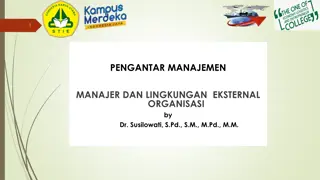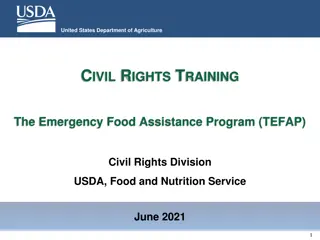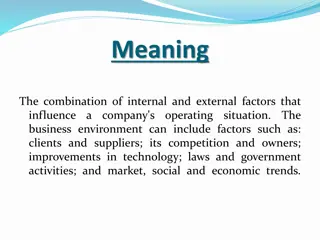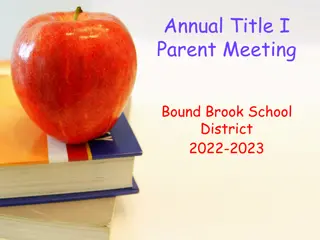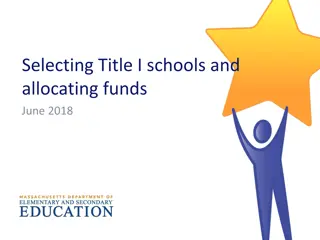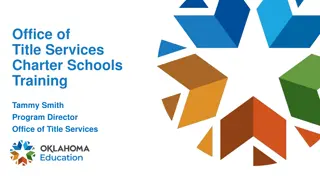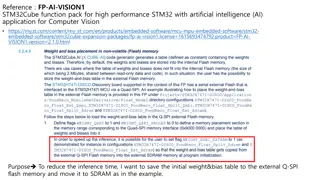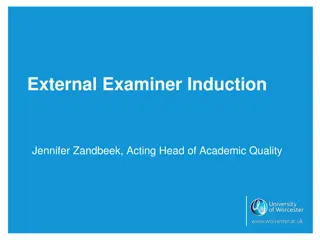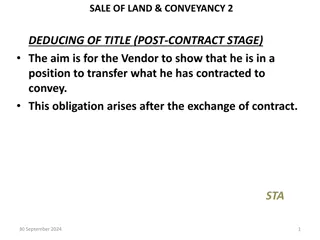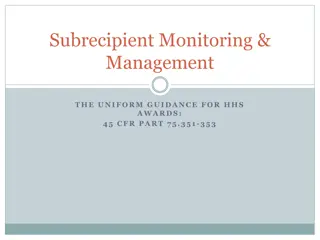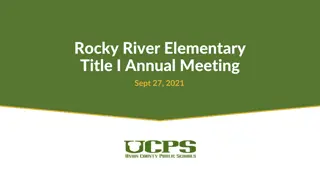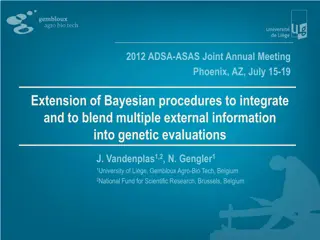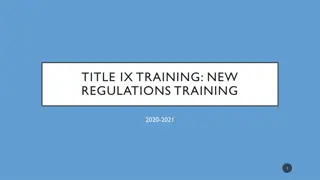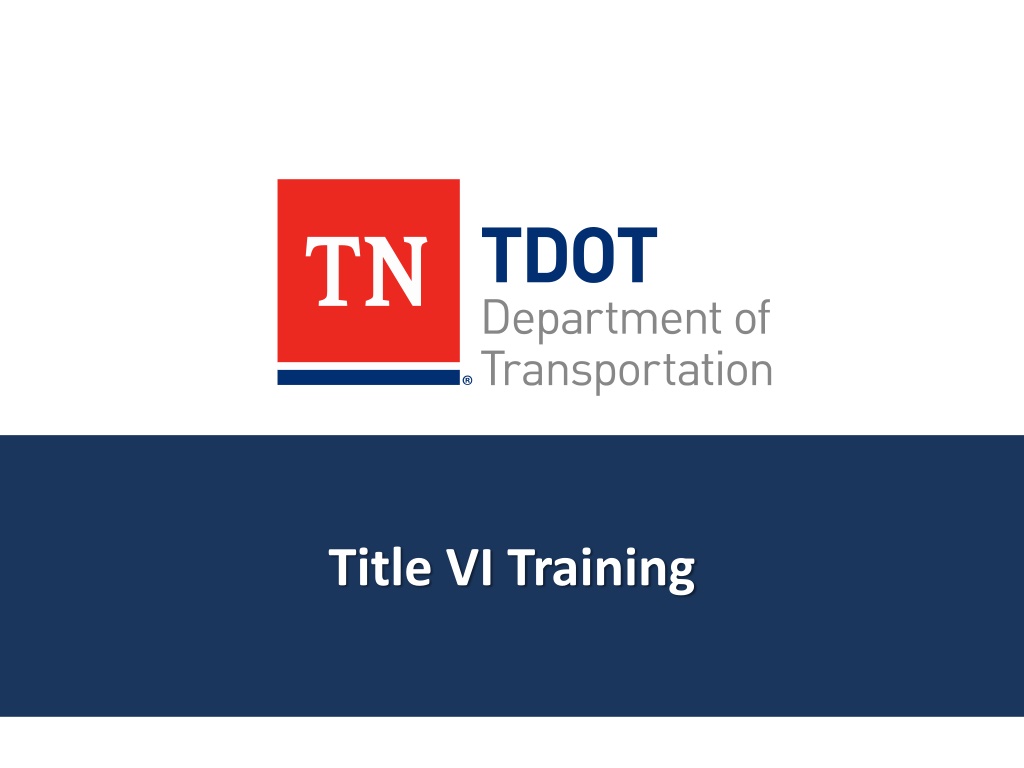
Understanding Title VI Training and Compliance
Title VI of the Civil Rights Act of 1964 prohibits discrimination on the basis of race, color, or national origin in programs receiving Federal assistance. This article covers the importance of Title VI training, its objectives, other nondiscrimination authorities related to Title VI, and the requirements for agencies to comply with Title VI regulations.
Uploaded on | 0 Views
Download Presentation

Please find below an Image/Link to download the presentation.
The content on the website is provided AS IS for your information and personal use only. It may not be sold, licensed, or shared on other websites without obtaining consent from the author. If you encounter any issues during the download, it is possible that the publisher has removed the file from their server.
You are allowed to download the files provided on this website for personal or commercial use, subject to the condition that they are used lawfully. All files are the property of their respective owners.
The content on the website is provided AS IS for your information and personal use only. It may not be sold, licensed, or shared on other websites without obtaining consent from the author.
E N D
Presentation Transcript
Title VI is a Federal Law Title VI of the Civil Rights Act of 1964 (42 U.S.C. 2000d) The Law States: No person in the United States shall, on the grounds of race, color, or national origin, be excluded from participation in, be denied the benefits of, or be subjected to discrimination under any program or activity receiving Federal financial assistance. 2
Training Objectives To ensure all management staff, subrecipients, contractees, and service beneficiaries are aware of the provisions of Title VI of the Civil Rights Act of 1964, and that the minimum requirements to be in compliance with its rules, laws, and regulations are met. 3
Other Nondiscrimination Authorities The following nondiscrimination authorities expanded the range and scope of Title VI coverage: The 1970 Uniform Act (42 U.S.C 4601) protection for people whose real property is acquired, or who move as a result of projects receiving federal funds Section 504 of the 1973 Rehabilitation Act (29 U.S.C 790) protection for individuals with disabilities Federal Highway Act of 1973 - Gender Added (23 U.S.C. 324) The 1975 Age Discrimination Act (42 U.S.C 6101) Executive Order 12898 in Environmental Justice (EJ) - protection for Minority and Low-Income communities Executive Order 13166 on Limited English Proficiency (LEP) 4
To Be Compliant With Title VI Your Agency Must: Appoint a Title VI coordinator Participate in TDOT s Title VI training Provide Title VI training to agency employees Develop and post a Title VI Nondiscrimination policy/statement in visible areas (to include website) 5
To Be Compliant With Title VI (contd) Your Agency Must: Acquire signed Title VI Nondiscrimination Assurances Monitor ethnicity and gender of contractors and subcontractors to ensure diversity and DBE utilization Include Title VI Nondiscrimination Assurances in all contracts Inform customers about Title VI annually and disseminate information to the public (i.e. website, poster, utility bill, water bill, newspaper ,radio, etc.) 6
Promote the Utilization of Certified Disadvantaged Business Enterprises (DBEs) Disadvantaged Business Enterprises (DBEs) are firms owned by small, minorities, women-owned, and other socially and economically disadvantaged persons. Your Agency Must: Provide the opportunity for participation on TDOT federally funded contracts by means of: Outreach to Certified DBEs on both goal and non-goal projects; Solicit Certified DBEs through all reasonable and available means (e.g., pre-bid meetings, advertisement, TDOT DBE list, etc.); 7
Promote the Utilization of Certified Disadvantaged Business Enterprises (DBEs) cont d Disadvantaged Business Enterprises (DBEs) are firms owned by small, minorities, women-owned, and other socially and economically disadvantaged persons. Your Agency Must: Provide the opportunity for participation on TDOT federally funded contracts by means of: Arrange times for presentation of bids, quantities, specifications and delivery schedules in ways that facilitate DBEs participation; Ensure that bid notices and requests for proposals are available to DBEs in a timely manner; and, Advertise with local and minority media resources. 8
Develop a Public Participation Plan Engage the public make communities aware of your agency s projects and/or services to allow for input in the decision-making process Your Agency Must: Conduct public meetings/hearings in centralized locations; Conduct public meetings/hearings at convenient times for communities that will be impacted; Advertise with local and minority owned media resources; and, Publicize meeting/hearing s dates and locations through agency s website and various other media. 9
Ensure your Contractors & Subcontractors Follow the Same Guidelines Subrecipients must ensure that all contractors and subcontractors awarded TDOT funded contracts adhere to Title VI and all other nondiscrimination authorities. 10
Minority and Women Representation on Planning Boards & Commissions The inclusion of minorities and women on planning boards and commissions is critical in establishing an equal access planning system. Subrecipients cannot deny a person the opportunity to participate as a member of a planning, advisory, or similar body which is an integral part of the program. 11
Have a Written Title VI Complaint Process & Complaint Log That: Instructions on how to file a complaint; Notifies the complainant that a complaint must filed within 180 days of the alleged occurrence or when the alleged discrimination became known to the complainant; Notifies the complainant that the complaint should be in writing and signed; Informs complainant on determining the jurisdiction, acceptability, and the need for additional information upon receipt to investigate the merit; Instructs complainant on other agencies a complaint could/should be filed with for investigation, and that the complaint should be forwarded to TDOT; Provides a timeline for length of investigation and final action within 60 days; and, Provides appeal instructions. 12
Executive Order 13166 Limited English Proficiency (LEP) EO 13166 requires Federal agencies and agencies receiving federal assistance to examine the services they provide, identify any need for services to those with limited English proficiency (LEP), and develop and implement a system to provide those services so LEP persons can have meaningful access to them. 13
Limited English Proficiency (LEP) Who is a LEP Person? An individual who has a limited ability to read, write, speak, or understand English because English is not the individual s primary language. 14
Take Reasonable Steps to Ensure Meaningful Access to Programs and Activities of LEP Persons Conduct an assessment of community/county s population by using the: Four Factor Analysis 1. Number or proportion of LEP persons eligible for services or likely to be encountered; 2. The frequency with which LEP persons come into contact with the program; 3. The nature and importance of the program, activity, or service provided by the program (agency); and, 4. Resources available and cost to the agency. 15
Evaluate Current Practices Identify actions already being taken and existing tools that can be used to provide meaningful access; Inventory existing materials that have been translated into other languages; Ensure staff is awareness of procedures; and, Develop a response plan (have procedures in place to ensure the are no barriers to participation in your programs and activities). 16
Executive Order 12898 Environmental Justice (EJ) - EO 12898, each Federal agency (agencies receiving federal assistance) must identify and address, as appropriate, disproportionately high and adverse human health or environmental effects of its programs, policies, and activities on minority and low- income populations. 17
Develop an Environmental Justice Process That includes: Aims for fair treatment and protection from environmental hazards for all; Provides meaningful involvement in decision-making means inclusive and accessible for all people; Provides good community impact assessments addressing the concerns of all people; Documents efforts taken to identify and engage minority and low- income populations; and, Provides an analysis for each alternative that offsets the benefits needed to be considered before making a determination. 18
Noncompliance Failure or refusal to comply with Title VI of the Civil Rights Act of 1964, other applicable Civil Rights Laws, and implementing departmental regulations. 19
Sanctions for Noncompliance If your agency is found to be noncompliant with Title VI of the 1964 Civil rights Act and other nondiscrimination authorities, your agency could be subject to: Withholding of payments under the contract until the compliance is met, and/or Cancellation, termination or suspension of the contract, in whole or in part 20
Title VI Related Videos The following slides contain the U.S. Department of Justice s videos for optional learning: 21
Understanding and Abiding by Title VI of the Civil Rights Act of 1964 22
Providing Meaningful Access for Limited English Proficient (LEPs) Individuals 23
Title VI Program Staff & Contact Information Phone: 615.741.3681 Toll Free: 1.888.370.3647 Jessica Starling Civil Rights Division Director Cynthia Howard Title VI Program Director Pamela Sharp Title VI Program Specialist Halmat Tayip Title VI Program Specialist James Wes White Title VI Program Specialist Statewide Statewide Regions 1 & 2 Region 3 Region 4 24


